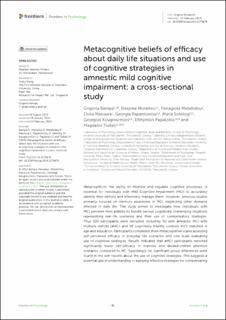| dc.contributor.author | Bampa, Grigoria | |
| dc.contributor.author | Moraitou, Despina | |
| dc.contributor.author | Metallidou, Panagiota | |
| dc.contributor.author | Masoura, Elvira | |
| dc.contributor.author | Papantoniou, Georgia | |
| dc.contributor.author | Sofologi, Maria | |
| dc.contributor.author | Kougioumtzis, Georgios | |
| dc.contributor.author | Papatzikis, Efthymios | |
| dc.contributor.author | Tsolaki, Magdalini | |
| dc.date.accessioned | 2024-02-14T12:11:28Z | |
| dc.date.available | 2024-02-14T12:11:28Z | |
| dc.date.created | 2024-02-13T09:36:49Z | |
| dc.date.issued | 2024 | |
| dc.identifier.issn | 1664-1078 | |
| dc.identifier.uri | https://hdl.handle.net/11250/3117539 | |
| dc.description.abstract | Metacognition, the ability to monitor and regulate cognitive processes, is essential for individuals with Mild Cognitive Impairment (MCI) to accurately identify their deficits and effectively manage them. However, previous studies primarily focused on memory awareness in MCI, neglecting other domains affected in daily life. This study aimed to investigate how individuals with MCI perceive their abilities to handle various cognitively challenging situations representing real-life scenarios and their use of compensatory strategies. Thus 100 participants were recruited, including 50 with amnestic MCI with multiple deficits (aMCI) and 50 cognitively healthy controls (HC) matched in age and education. Participants completed three metacognitive scales assessing self-perceived efficacy in everyday life scenarios and one scale evaluating use of cognitive strategies. Results indicated that aMCI participants reported significantly lower self-efficacy in memory and divided-shifted attention scenarios compared to HC. Surprisingly, no significant group differences were found in the self-reports about the use of cognitive strategies. This suggests a potential gap in understanding or applying effective strategies for compensating cognitive deficits. These findings emphasize the importance of cognitive training programs targeting metacognitive knowledge enhancement and practical use of cognitive strategies that could enhance the quality of life for individuals with MCI. | en_US |
| dc.language.iso | eng | en_US |
| dc.publisher | Frontiers Media | en_US |
| dc.relation.ispartofseries | Frontiers in Psychology; | |
| dc.rights | Navngivelse 4.0 Internasjonal | * |
| dc.rights.uri | http://creativecommons.org/licenses/by/4.0/deed.no | * |
| dc.title | Metacognitive beliefs of efficacy about daily life situations and use of cognitive strategies in amnestic mild cognitive impairment: a cross-sectional study | en_US |
| dc.type | Peer reviewed | en_US |
| dc.type | Journal article | en_US |
| dc.description.version | publishedVersion | en_US |
| cristin.ispublished | true | |
| cristin.fulltext | original | |
| cristin.qualitycode | 1 | |
| dc.identifier.doi | http://dx.doi.org/10.3389/fpsyg.2024.1275678 | |
| dc.identifier.cristin | 2245353 | |
| dc.source.journal | Frontiers in Psychology | en_US |

